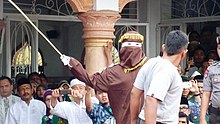

The province of Aceh in Indonesia enforces some provisions of Islamic criminal law, the sole Indonesian province to do so. In Aceh, Islamic criminal law is called jinayat (an Arabic loanword). The laws that implement it are called Qanun Jinayat or Hukum Jinayat, roughly meaning "Islamic criminal code".[1][a] Although the largely-secular laws of Indonesia apply in Aceh, the provincial government passed additional regulations, some derived from Islamic criminal law, after Indonesia authorized the province to enact regional regulations and granted Aceh special autonomy to implement Islamic law. Offences under the provisions include alcohol consumption, production and distribution, gambling, adultery, rape, sexual harassment, certain intimacies outside marriage, and certain homosexual acts. Punishments include caning, fines, and imprisonment. There is no provision for stoning; an attempt to introduce it in 2009 was vetoed by Governor Irwandi Yusuf. In 2016 Aceh processed 324 first instance court cases under Islamic criminal law, and carried out at least 100 caning sentences.
Supporters of Islamic criminal law defend its legality under the special autonomy granted to Aceh. Critics, including Amnesty International, object to the use of caning as a punishment, as well as the criminalization of consensual sex outside marriage.
Cite error: There are <ref group=lower-alpha> tags or {{efn}} templates on this page, but the references will not show without a {{reflist|group=lower-alpha}} template or {{notelist}} template (see the help page).
© MMXXIII Rich X Search. We shall prevail. All rights reserved. Rich X Search
